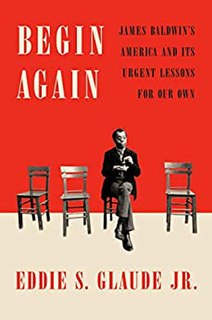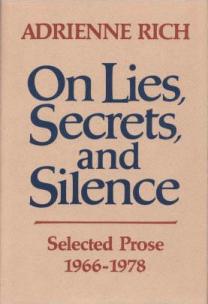 W
W"Ain't I a Woman?" is a speech, delivered extemporaneously, by Sojourner Truth (1797–1883), born into slavery in New York State. Some time after gaining her freedom in 1827, she became a well known anti-slavery speaker. Her speech was delivered at the Women's Convention in Akron, Ohio, on May 29, 1851, and did not originally have a title.
 W
WBegin Again: James Baldwin's America and Its Urgent Lessons for Our Own is a 2020 book by Eddie S. Glaude Jr. Covering the life and works of American writer and activist James Baldwin, and the theme of racial inequality in the United States, Glaude uses these topics to discuss what he views as historical failed opportunities for America to "begin again". He analyzes Baldwin's activism and sexuality and his non-fiction writings, perceiving a shift in his later works. Glaude uses ideas from Baldwin to comment on contemporary racial topics such as the Black Lives Matter movement, which began in 2013.
 W
WBlack Sexual Politics: African Americans, Gender and the New Racism by Patricia Hill Collins is a work of critical theory that discusses the way that race, class and gender intersect to affect the lives of African American men and women in many different ways, but with similar results. The book explores the way that new forms of racism can work to oppress black people, while filling them with messages of liberation.
 W
WBrit(ish): On Race, Identity and Belonging is a 2018 book by the journalist Afua Hirsch. The book is part-memoir and discusses black history, culture and politics in the context of Britain, Senegal and Ghana. It received mixed critical reception.
 W
WChokehold: Policing Black Men is a 2017 non fiction book by Paul Butler. It was nominated for the NAACP Image Award for Outstanding Literary Work in the Nonfiction category in 2018.
 W
WThe Color of Law: A Forgotten History of How Our Government Segregated America is a 2017 book by Richard Rothstein on the history of racial segregation in the United States. The book documents the history of state sponsored segregation stretching back to the late 1800s and exposes racially discriminatory policies put forward by most presidential administrations in that time, including liberal presidents like Franklin Roosevelt. The author argues that intractable segregation in America is the byproduct of explicit government policies at the local, state, and federal levels, also known as de jure segregation — and not happenstance, or de facto segregation. Among other discussions, the book provides a history of subsidized housing and discusses the phenomenons of white flight, blockbusting, and racial covenants, and their role in housing segregation. Rothstein wrote the book while serving as a research associate for the Economic Policy Institute, where he is now a Distinguished Fellow.
 W
WThe End of Policing is a 2017 book by the American sociologist Alex S. Vitale. The author argues for the eventual abolition of the police, to be replaced variously by decriminalization or with non-law enforcement approaches, depending on the crime. Vitale argues that the function of police is to uphold inequalities of class, gender, race or sexuality.
 W
WThe First Civil Right: How Liberals Built Prison America is a 2014 non-fiction book by political scientist Naomi Murakawa, who is a professor of African American studies at Princeton University. The book addresses causes of the rapid increase in U.S. incarceration rates since the 1970s and of racial inequality in the U.S. prison system. Specifically, Murakawa traces the role of liberal politicians, particularly national-level Democrats, in shaping racially unequal incarceration policies. For the book, Murakawa was awarded the Michael Harrington Book Award by the New Political Science section of the APSA in 2015.
 W
WThe History of White People is a 2010 book by Nell Irvin Painter, in which the author explores the idea of whiteness throughout history, beginning with ancient Greece and continuing through the beginning of scientific racism in early modern Europe to 19th- through 21st-century America.
 W
WHow to Be an Antiracist is a 2019 nonfiction book by American author and historian Ibram X. Kendi. The book discusses concepts of racism and Kendi's proposals for anti-racist individual actions and systemic changes. It received a mixed critical reception.
 W
WHow to Be Black is a book written by the American comedian Baratunde Thurston. It is an autobiographical account of Thurston's life and upbringing and discusses stereotypes of African Americans, their social identities, and their relationships with their white peers.
 W
WLife on the Mississippi (1883) is a memoir by Mark Twain of his days as a steamboat pilot on the Mississippi River before the American Civil War. It is also a travel book, recounting his trip up the Mississippi River from New Orleans to Saint Paul many years after the war.
 W
WMe and White Supremacy: Combat Racism, Change the World, and Become a Good Ancestor is a book by Layla Saad published on January 28, 2020. Structured as a 28-day guide targeted at white readers, the book aims to aid readers in identifying the impact of white privilege and white supremacy over their lives. It contains quotations, terminology definitions and question prompts. It received positive critical reception, entering many bestseller lists in June 2020 after a surge in popularity in the wake of the killing of George Floyd and subsequent protests.
 W
WOn Lies, Secrets and Silence (ISBN 0393312852) is a 310-page, non-fiction book written by Adrienne Rich and published by W. W. Norton & Company in 1979. The book follows the author, Adrienne Rich telling and informing the readers about themes and aspects of her life and work. Other topics which the book cover include the politics of language, racism and history.
 W
WThe Racial Contract is an essay by the Jamaican philosopher Charles W. Mills in which he attempts to show that, although it is conventional to represent the social contract moral and political theories of Thomas Hobbes, John Locke, Jean-Jacques Rousseau, and Immanuel Kant as neutral with respect to race and ethnicity, in actuality, the philosophers understood them to regulate only relations between whites; in relation to non-whites, these philosophers helped to create a "racial contract", which in both formal and informal ways permitted whites to oppress and exploit non-whites and violate their own moral ideals in dealing with non-whites. Because in contemporary political philosophy, white philosophers take their own white privilege for granted, they don't recognize that white supremacy is a political system, and so in their developments of ideal, moral and political theory never consider actual practice. Mills proposes to develop a non-ideal theory "to explain and expose the inequities of the actual nonideal policy and to help us see through the theories and moral justifications offered in defense of them." Using it as a central concept, "the notion of a Racial Contract might be more revealing of the real character of the world we are living in, and the corresponding historical deficiencies of its normative theories and practices, than the raceless notions currently dominant in political theory."
 W
WRacism Explained to My Daughter is a book in which the author, during a demonstration against an immigration law in Paris, answers his daughter's questions about the reasons for racism.
 W
WSister Outsider: Essays and Speeches is a collection of essential essays and speeches written by Audre Lorde, a woman who wrote from the particulars of her identity: Black woman, lesbian, poet, activist, cancer survivor, mother, and feminist writer. This collection, now considered a classic volume, of Lorde's most influential works of non-fiction prose has had a groundbreaking impact in the development of contemporary feminist theories. In fifteen essays and speeches dating from 1976 to 1984, Lorde explores the complexities of intersectional identity, while explicitly drawing from her personal experiences of oppression to include: sexism, heterosexism, racism, homophobia, classism, and ageism. The book examines a broad range of topics, including love, self-love, war, imperialism, police brutality, coalition building, violence against women, Black feminism, and movements towards equality that recognize and embrace differences as a vehicle for change. With meditative conscious reasoning, Lorde explores her misgivings for the widespread marginalization deeply-rooted in the United States’ white patriarchal system, all the while, offering messages of hope. The essays in this landmark collection are extensively taught and have become a widespread area of academic analysis. Lorde's philosophical reasoning that recognizes oppressions as complex and interlocking designates her work as a significant contribution to critical social theory.
 W
WSkin: Talking About Sex, Class And Literature is a collection of essays written by award-winning author Dorothy Allison. Published in 1994, the book contains original essays as well as updated versions of essays that appeared in anthologies and magazines like New York Native, The Village Voice, and Forum. As the title suggests, Allison gives the reader her take on her difficult childhood, race- and class-based schisms within the lesbian community, feminism, pornography, sadomasochism, and the transcending effect that literature can have on children.
 W
WSo You Want to Talk About Race is a 2018 non-fiction book by Ijeoma Oluo. Each chapter title is a question about race in contemporary America. Oluo outlines her opinions on the topics as well as advice about how to talk about the issues. The book received positive critical reception, with renewed interest following the May 2020 killing of George Floyd, after which the book re-entered The New York Times Best Seller list.
 W
WThey Were Her Property: White Women as Slave Owners in the American South is a nonfiction history book by Stephanie Jones-Rogers. They Were Her Property is "the first extensive study of the role of Southern white women in the plantation economy and slave-market system" and disputes conventional wisdom that white women played a passive or minimal role in slaveholding. It was published by Yale University Press and released on February 19, 2019. For the book Jones-Rogers received the Los Angeles Times Book Prize and the Merle Curti Social History Award from the Organization of American Historians.
 W
WWe Real Cool: Black Men and Masculinity is a 2004 book about masculinity by feminist author bell hooks. It collects ten essays on black males. The title alludes to Gwendolyn Brooks' 1959 poem "We Real Cool". The essays are intended to provide cultural criticism and solutions to the problems she identifies.
 W
WWhite Guilt: How Blacks and Whites Together Destroyed the Promise of the Civil Rights Era is a book by American author Shelby Steele in 2006.